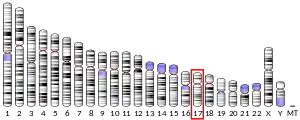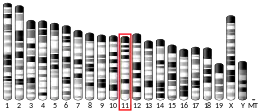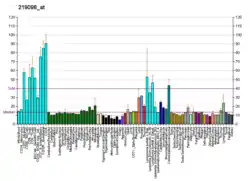Myb-binding protein 1A is a protein that in humans is encoded by the MYBBP1A gene.[5][6]
References
- 1 2 3 GRCh38: Ensembl release 89: ENSG00000132382 - Ensembl, May 2017
- 1 2 3 GRCm38: Ensembl release 89: ENSMUSG00000040463 - Ensembl, May 2017
- ↑ "Human PubMed Reference:". National Center for Biotechnology Information, U.S. National Library of Medicine.
- ↑ "Mouse PubMed Reference:". National Center for Biotechnology Information, U.S. National Library of Medicine.
- ↑ Keough R, Woollatt E, Crawford J, Sutherland GR, Plummer S, Casey G, Gonda TJ (Mar 2000). "Molecular cloning and chromosomal mapping of the human homologue of MYB binding protein (P160) 1A (MYBBP1A) to 17p13.3". Genomics. 62 (3): 483–9. doi:10.1006/geno.1999.6035. PMID 10644447.
- ↑ "Entrez Gene: MYBBP1A MYB binding protein (P160) 1a".
Further reading
- Favier D, Gonda TJ (1994). "Detection of proteins that bind to the leucine zipper motif of c-Myb". Oncogene. 9 (1): 305–11. PMID 8302594.
- Bonaldo MF, Lennon G, Soares MB (1997). "Normalization and subtraction: two approaches to facilitate gene discovery". Genome Res. 6 (9): 791–806. doi:10.1101/gr.6.9.791. PMID 8889548.
- Tavner FJ, Simpson R, Tashiro S, et al. (1998). "Molecular cloning reveals that the p160 Myb-binding protein is a novel, predominantly nucleolar protein which may play a role in transactivation by Myb". Mol. Cell. Biol. 18 (2): 989–1002. doi:10.1128/MCB.18.2.989. PMC 108811. PMID 9447996.
- Wiemann S, Weil B, Wellenreuther R, et al. (2001). "Toward a catalog of human genes and proteins: sequencing and analysis of 500 novel complete protein coding human cDNAs". Genome Res. 11 (3): 422–35. doi:10.1101/gr.GR1547R. PMC 311072. PMID 11230166.
- He B, Minges JT, Lee LW, Wilson EM (2002). "The FXXLF motif mediates androgen receptor-specific interactions with coregulators". J. Biol. Chem. 277 (12): 10226–35. doi:10.1074/jbc.M111975200. PMID 11779876.
- Andersen JS, Lyon CE, Fox AH, et al. (2002). "Directed proteomic analysis of the human nucleolus". Curr. Biol. 12 (1): 1–11. doi:10.1016/S0960-9822(01)00650-9. PMID 11790298. S2CID 14132033.
- Ohta S, Shiomi Y, Sugimoto K, et al. (2002). "A proteomics approach to identify proliferating cell nuclear antigen (PCNA)-binding proteins in human cell lysates. Identification of the human CHL12/RFCs2-5 complex as a novel PCNA-binding protein". J. Biol. Chem. 277 (43): 40362–7. doi:10.1074/jbc.M206194200. PMID 12171929.
- Scherl A, Couté Y, Déon C, et al. (2003). "Functional proteomic analysis of human nucleolus". Mol. Biol. Cell. 13 (11): 4100–9. doi:10.1091/mbc.E02-05-0271. PMC 133617. PMID 12429849.
- Strausberg RL, Feingold EA, Grouse LH, et al. (2003). "Generation and initial analysis of more than 15,000 full-length human and mouse cDNA sequences". Proc. Natl. Acad. Sci. U.S.A. 99 (26): 16899–903. Bibcode:2002PNAS...9916899M. doi:10.1073/pnas.242603899. PMC 139241. PMID 12477932.
- Brajenovic M, Joberty G, Küster B, et al. (2004). "Comprehensive proteomic analysis of human Par protein complexes reveals an interconnected protein network". J. Biol. Chem. 279 (13): 12804–11. doi:10.1074/jbc.M312171200. PMID 14676191.
- Ota T, Suzuki Y, Nishikawa T, et al. (2004). "Complete sequencing and characterization of 21,243 full-length human cDNAs". Nat. Genet. 36 (1): 40–5. doi:10.1038/ng1285. PMID 14702039.
- Fan M, Rhee J, St-Pierre J, et al. (2004). "Suppression of mitochondrial respiration through recruitment of p160 myb binding protein to PGC-1alpha: modulation by p38 MAPK". Genes Dev. 18 (3): 278–89. doi:10.1101/gad.1152204. PMC 338281. PMID 14744933.
- Beausoleil SA, Jedrychowski M, Schwartz D, et al. (2004). "Large-scale characterization of HeLa cell nuclear phosphoproteins". Proc. Natl. Acad. Sci. U.S.A. 101 (33): 12130–5. Bibcode:2004PNAS..10112130B. doi:10.1073/pnas.0404720101. PMC 514446. PMID 15302935.
- Gerhard DS, Wagner L, Feingold EA, et al. (2004). "The status, quality, and expansion of the NIH full-length cDNA project: the Mammalian Gene Collection (MGC)". Genome Res. 14 (10B): 2121–7. doi:10.1101/gr.2596504. PMC 528928. PMID 15489334.
- Andersen JS, Lam YW, Leung AK, et al. (2005). "Nucleolar proteome dynamics". Nature. 433 (7021): 77–83. Bibcode:2005Natur.433...77A. doi:10.1038/nature03207. PMID 15635413. S2CID 4344740.
- Nousiainen M, Silljé HH, Sauer G, et al. (2006). "Phosphoproteome analysis of the human mitotic spindle". Proc. Natl. Acad. Sci. U.S.A. 103 (14): 5391–6. Bibcode:2006PNAS..103.5391N. doi:10.1073/pnas.0507066103. PMC 1459365. PMID 16565220.
- Beausoleil SA, Villén J, Gerber SA, et al. (2006). "A probability-based approach for high-throughput protein phosphorylation analysis and site localization". Nat. Biotechnol. 24 (10): 1285–92. doi:10.1038/nbt1240. PMID 16964243. S2CID 14294292.
- Olsen JV, Blagoev B, Gnad F, et al. (2006). "Global, in vivo, and site-specific phosphorylation dynamics in signaling networks". Cell. 127 (3): 635–48. doi:10.1016/j.cell.2006.09.026. PMID 17081983. S2CID 7827573.
- Owen HR, Elser M, Cheung E, et al. (2007). "MYBBP1a is a novel repressor of NF-kappaB". J. Mol. Biol. 366 (3): 725–36. doi:10.1016/j.jmb.2006.11.099. PMID 17196614.
- Fuller HR, Man NT, Lam LT, et al. (2010). "The SMN interactome includes Myb-binding protein 1a". J. Proteome Res. 9 (1): 556–63. doi:10.1021/pr900884g. PMID 19928837.
This article is issued from Wikipedia. The text is licensed under Creative Commons - Attribution - Sharealike. Additional terms may apply for the media files.




